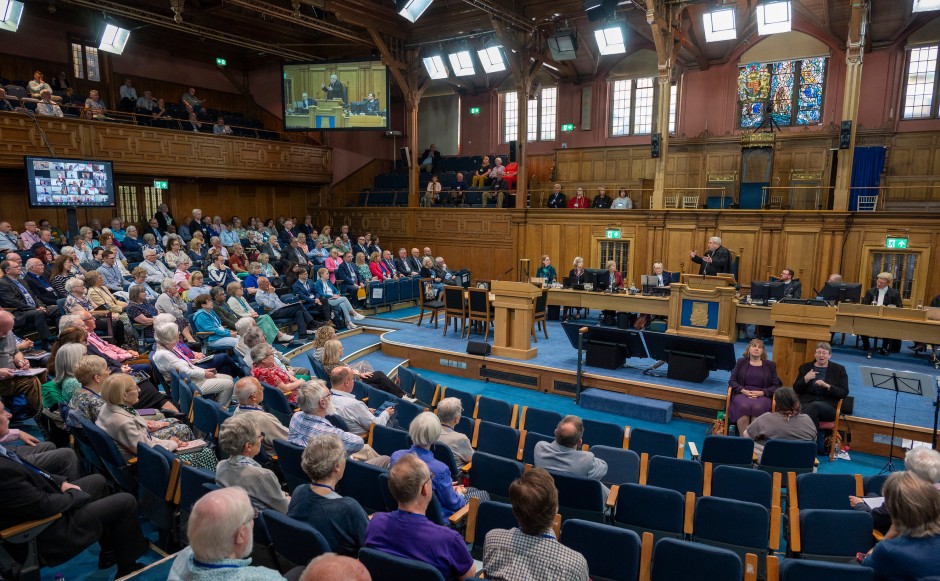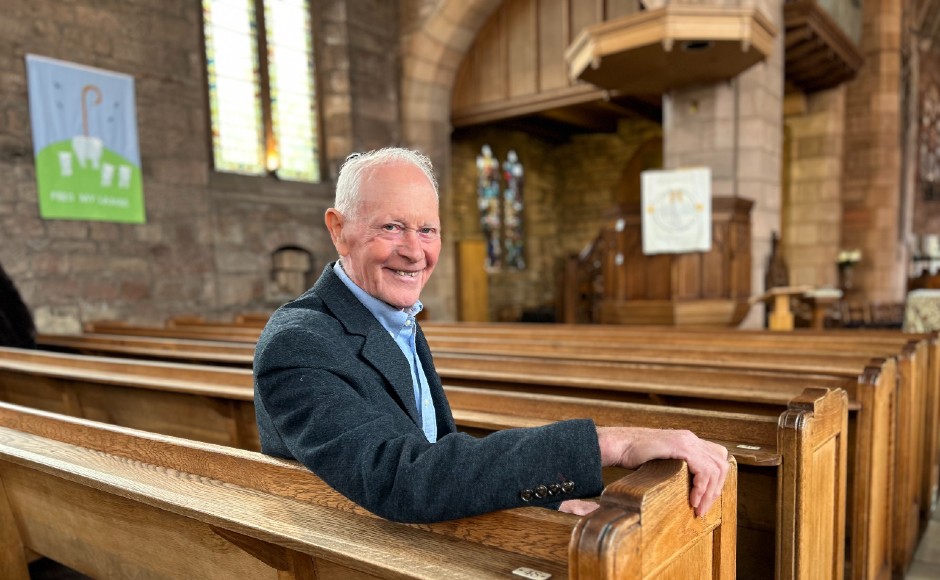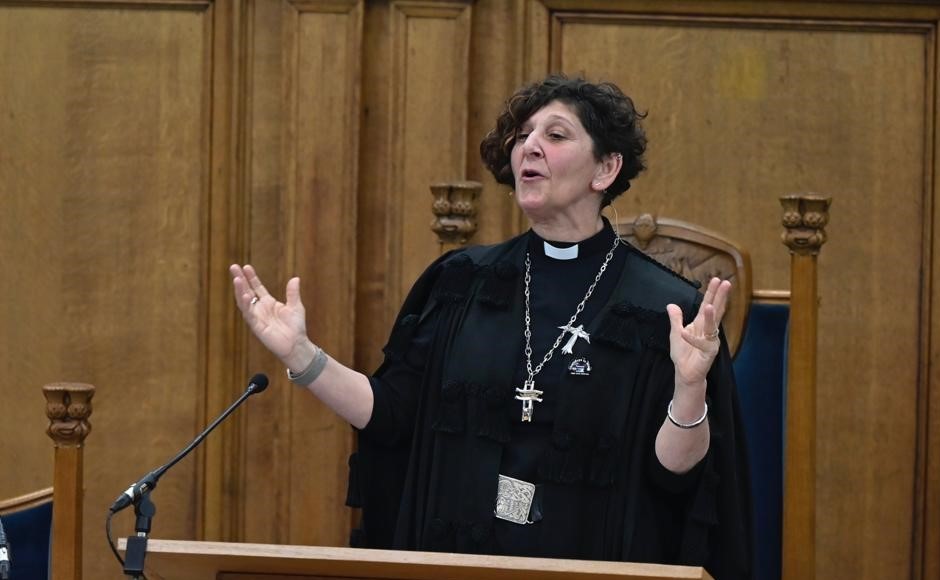Elder's terminally ill sister asked for help to end her life
Published on 29 May 2024 6 minutes read
A Church elder has revealed that her terminally ill sister asked her for help to end her life .
Susan Pym of St Columba's Church in London said her sibling endured immense suffering for a long time but she could not do it.
Her sister suffered from a rare disease which left her completely immobile and was provided palliative care in a hospice.

Mrs Pym helped look after her for three years and said the last words she heard her whisper were "help me, help me' but no-one could.
The elder shared her heart-breaking story at the General Assembly during a session to provide an update on work to re-examine the Church's official opposition to assisted dying.
A working group is currently exploring more deeply the diverse views held by Kirk members on the controversial subject and will report to the General Assembly next year.
The move is in response to the Assisted Dying for Terminally Ill Adults (Scotland) Bill which has been introduced to the Scottish Parliament.
Mrs Pym said: "For three years, I helped to care for my younger sister and was there for her final days.
"She suffered from a thankfully rare but horrendous disease which in the end left her with nothing.
"During her final months she asked me on three occasions to fetch her some bleach thinking that drinking it would end her misery - I couldn't do it.
"The last words I heard her whisper were "help me, help me", but no-one could.
"I wish I could say she died peacefully, but in reality, she didn't, although the staff did all that was available to them.
"I am sure I suffered from post-traumatic stress disorder afterwards.
Caring hospice staff
Mrs Pym's 56-year-old sister died in December 2021 and she does not believe that God would have wanted her to suffer.
Addressing commissioners, she said: "If you have walked in my shoes then I know that you will empathise with my plea for the Church to support carefully regulated assisted dying.
"If you haven't walked in my shoes then I pray you never have to."
Mrs Pym described the hospice staff who looked her sister as "wonderful and caring" and they did all that they could for her.
It is not uncommon for people to compare the plight of sick animals and putting them to sleep to the torment faced by terminally ill people.

Rev Allan Wright, the Church's first ever dedicated minister for the veterinary community, shared his perspective at the General Assembly.
The working vet runs a practice with his wife in the north-east of England and said owners would find themselves open to prosecution if they left their animals in a poor state of health.
"We are taught in vet school that death is not a welfare concern, it is an ethical concern and that is why we have to discuss it," he added.
"If the welfare of an individual is significantly negative with no hope of recovering and by allowing them to die peacefully and respectfully, we can actually improve their welfare by returning it to zero.
"As vets we joke sometimes about how easy being a doctor must be, you know exactly what species is coming through the door.
"But one thing vets tell me they couldn't do in human medicine, the one thing they say that means they could not be doctors, is the necessity, as they see it, to let their patients suffer."
Theological and ethical opinions
Rev Dr John Ferguson, convener of the Assisted Dying working group, said the issue provokes strong feelings and passionate debate with polling showing that a majority of the public in the UK are in favour of the policy being made legal.
This is in contrast to the vast majority of Christian denominations and other faith groups in which there is consistent strong opposition to the legalisation of assisted dying," he added.
Dr Ferguson said: "Legislation is pending in both the Westminster and Holyrood parliaments and it's possible that the Isle of Man or Jersey could become the first part of the British Isles to legalise assisted dying.
"It is legal in a number of European countries with legislation going before the French parliament later this month."
In Spain, assisted dying is recognised as a constitutional right, Canada allows doctors to prescribe drugs for terminally ill patients to administer themselves and it is legal in 11 of the 50 US states.
Dr Ferguson said: "The Church of Scotland has always opposed assisted dying but there was undoubtedly a shift in last year's debate at the Assembly.
"The Assembly recognised that there exists a range of theological and ethical opinions on the subject and asked that these views and opinions be explored.
"As our report makes clear, we intend to continue our listening exercise by meeting with experts in palliative care and others in the medical profession, healthcare and hospice chaplains, CrossReach and other care providers and with representatives from other denominations.
"We will also endeavour to provide space to presbyteries to allow them to explore this issue and we already have a day conference for one presbytery in the diary.
"We will explore the deep concerns that people have about what they see as the risks of legalising assisted dying and the importance of safeguards."
Dr Ferguson said the working group will continue to wrestle with the moral and theological principles around the policy and plan to meet the bill's sponsor, Liam McArthur MSP for Orkney, later this year to discuss proposed safeguards against the law being abused.
Addressing commissioners, Rev Irene Munro of Ferintosh Parish Church in Conon Bridge, Highland, said: "I would like to urge the working party to think more medically as well as theologically because we cannot divide ourselves like that.
"In Oregon, a survey found that 50% of those who wanted assisted dying did it because they felt like a burden on other people."
Jesus on the cross
Rev Dr Julia Pizzuto-Pomaco of Peterhead New Parish Church, told the General Assembly her husband Joe died 18 months ago of motor neurone disease.
"This is not just an academic exercise and I would encourage people here to take the time to listen to people's conversation," she said.
"It is still a journey for us and my concern is we would listen to the value in suffering as well.
"Jesus on the cross said ‘my God, my God why have you forsaken me?'
"There have been times I have cried that, there were times when my husband cried that while he could barely get out of bed or raise his hand.
"This was a 57-year-old man struck down in his prime, it happens and we know there are hard, hard situations but there was value in it."
The minister asked the working group to examine the difference between the withdrawal of medical provision and voluntary assisted dying.
Dr Ferguson said it had been an incredibly helpful debate for the working group which is "halfway" through its work.
"Some of the contributions have been very powerful and very moving, everyone has been very helpful and we will take it all on board as we move forward," he added,
"A briefing from Marie Curie indicates that palliative care need in Scotland is projected to increase by up to 20% by 2040.
"By 2024, up to 90% of people who die may need a palliative care approach in Scotland and Marie Curie is calling for some very significant measures to increase support for those requiring such care."
Complex and controversial
Despite opinion polls, Dr Ferguson said it was not a given that the majority of members of the Scottish Parliament would back the proposed bill and the law would be changed.
"It is not a known factor at the moment and I would encourage members of the Assembly and people in churches, to engage with their MSPs, whatever your view might be," he added.
"Some Christians will see assisted dying as diminishing the sanctity of life as given to us by God and will point to Biblical examples to back this up such as the Biblical concept of Imago Dei.
"Others will argue that there are no Biblical or theological reasons to be against ending someone's suffering and offering them a dignified death.
"What we are seeking to do is assist and resource the Church going forward as it seeks to deal with this complex, controversial and important issue."


